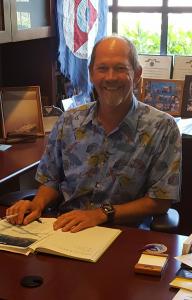Russell "Rusty" Brainard

Voices from the Science Centers
Voices from the Science Centers is an oral history initiative dedicated to documenting the institutional knowledge of fisheries scientists and administrators in the labs of NOAA’s Fisheries Science Centers.
Dr. Rusty Brainard began work for NOAA on the first day he graduated from Texas A&M University in May of 1981. Shortly thereafter he was assigned as Station Chief for the Geophysical Monitoring for Climatic Change Station at the South Pole, Antarctica. From 1984-2002, he was based at the Southwest Fisheries Science Center in Monterey, California studying
coastal fisheries and climate variability from Alaska to Chile. He joined the Pacific Islands Fisheries Science Center in 2002 where he did his Master’s Thesis on how currents that flow around seamounts affect fisheries in the Northwestern Hawaiian archipelago. He earned his Ph.D. at NOAA's Pacific Marine Environmental Lab working on the physical oceanography of El Nino.
In 1994 he became the Commanding Officer of the research vessel Townsend Cromwell for a record 39 months and did approximately 300 dives in the Northwestern Hawaiian Islands. He was then assigned to the ecosystem and oceanography investigation at the Pacific Islands Fisheries Science Center in Honolulu, where he works today as a supervisory oceanographer. He is the founding Chief of the Coral Reef Ecosystem Division (CRED). From 2005-2010, Rusty was co-PI of the Census of Coral Reef Ecosystems project of the Census of Marine Life developing tools to systematically monitor the biodiversity of coral reefs. Since 2010, Rusty has served as NOAA’s Technical Lead for the US Coral Triangle Initiative’s Ecosystem Approach to Fisheries Management (EAFM).
Interview contains discussions of: fisheries management, climate change, seamounts, coral reef ecosystems, ecosystems-based fisheries management, ocean acidification, technology changes impact on science, autonomous reef monitoring structures (ARMS), biodiversity, genetic sequencing, acoustics and ocean soundscapes.
In this interview Rusty discussed his long history working for NOAA on a variety of complex issues related to fisheries management, climate change, flow topography of seamounts, assessment of coral reef ecosystems, technological advances in genetic and acoustic research related to fisheries, the challenges faced in doing research in the Pacific Islands Region, and the
national and global efforts to shift from single species stock-assessment-based fisheries management towards ecosystem-based fisheries management.
He has conducted his research in many parts of the globe including the Western Seaboard of the Americas, Antarctica, and the Pacific Remote Islands.
He discusses how fisheries scientists are trying to improve predictions on how the global oceans are changing due to climate change and acidification, and how these changes affect food security, changes to livelihoods, and changes to other societal benefits coming from the ocean.
Please Note: The oral histories in this collection are protected by copyright and have been created for educational, research and personal use as described by the Fair Use Doctrine in the U.S. Copyright law. Please reach out Voices@noaa.gov to let us know how these interviews are being used in your research, project, exhibit, etc. The Voices staff can help provide other useful resources related to your inquiry.
The NOAA mission is to understand and predict changes in climate, weather, oceans, and coasts, to share that knowledge and information with others, and to conserve and manage coastal and marine ecosystems and resources. The Voices Oral History Archives offers public access to a wide range of accounts, including historical materials that are products of their particular times, and may contain offensive language or negative stereotypes.
Voices Oral History Archives does not verify the accuracy of materials submitted to us. The opinions expressed in the interviews are those of the interviewee only. The interviews here have been made available to the public only after the interviewer has confirmed that they have obtained consent.
